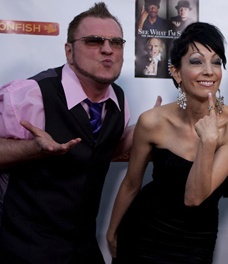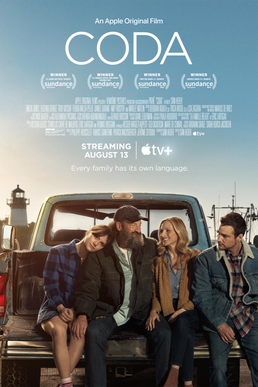
International Sign (IS) is a pidgin sign language which is used in a variety of different contexts, particularly as an international auxiliary language at meetings such as the World Federation of the Deaf (WFD) congress, in some European Union settings, and at some UN conferences, at events such as the Deaflympics, the Miss & Mister Deaf World, and Eurovision, and informally when travelling and socialising.
Auslan is the sign language used by the majority of the Australian Deaf community. The term Auslan is a portmanteau of "Australian Sign Language", coined by Trevor Johnston in the 1980s, although the language itself is much older. Auslan is related to British Sign Language (BSL) and New Zealand Sign Language (NZSL); the three have descended from the same parent language, and together comprise the BANZSL language family. Auslan has also been influenced by Irish Sign Language (ISL) and more recently has borrowed signs from American Sign Language (ASL).
Linda Bove Waterstreet is a Deaf American actress, her most notable role being a fictionalized version of herself in the PBS children's series Sesame Street from 1971 to 2002. Bove was the first Deaf actress to be a member of the program's recurring cast.
Interpreting is a translational activity in which one produces a first and final target-language output on the basis of a one-time exposure to an expression in a source language.

New Zealand Sign Language or NZSL is the main language of the deaf community in New Zealand. It became an official language of New Zealand in April 2006 under the New Zealand Sign Language Act 2006. The purpose of the act was to create rights and obligations in the use of NZSL throughout the legal system and to ensure that the Deaf community had the same access to government information and services as everybody else. According to the 2013 Census, over 20,000 New Zealanders know NZSL.

South African Sign Language is the primary sign language used by deaf people in South Africa. The South African government added a National Language Unit for South African Sign Language in 2001. SASL is not the only manual language used in South Africa, but it is the language that is being promoted as the language to be used by the Deaf in South Africa, although Deaf peoples in South Africa historically do not form a single group.

The National Theatre of the Deaf (NTD) is a Connecticut-based theatre company founded in 1967. It is the oldest theatre company in the United States with a continuous history of domestic and international touring, as well as producing original works. NTD productions combine American Sign Language with spoken language to fulfill the theatre's mission statement of linking Deaf and hearing communities, providing more exposure to sign language, and educating the public about Deaf art. The NTD is affiliated with a drama school, also founded in 1967, and with the Little Theatre of the Deaf (LTD), established in 1968 to produce shows for a younger audience.
A child of deaf adult, often known by the acronym CODA, is a person who was raised by one or more deaf parent or legal guardian. Ninety percent of children born to deaf adults can hear normally, resulting in a significant and widespread community of CODAs around the world, although whether the child is hearing, deaf, or hard of hearing has no effect on the definition. The acronym KODA is sometimes used to refer to CODAs under the age of 18.
Kenyan Sign Language is a sign language used by the deaf community in Kenya and Somalia. It is used by over half of Kenya's estimated 600,000 deaf population. There are some dialect differences between Kisumu, Mombasa and Somalia.

A video relay service (VRS), also sometimes known as a video interpreting service (VIS), is a video telecommunication service that allows deaf, hard-of-hearing, and speech-impaired (D-HOH-SI) individuals to communicate over video telephones and similar technologies with hearing people in real-time, via a sign language interpreter.
Keith Wann is an American comedian and performance artist.
The Theatre Development Fund (TDF) is a not-for-profit performing arts service organization in New York City. Created in 1968 to help an ailing New York theatre industry, TDF has grown into the nation's largest performing arts nonprofit, providing support to more than 900 plays and musicals and returning upwards of $1.5 billion in revenue to thousands of Broadway, Off-Broadway and Off-Off-Broadway music and dance productions.
Bill O'Brien is a television series actor, and the Senior Advisor for Program Innovation at the National Endowment of the Arts, shortly after the election of President Barack Obama in 2008.
Telephone interpreting connects human interpreters via telephone to individuals who wish to speak to each other but do not share a common language. The telephone interpreter converts the spoken language from one language to another, enabling listeners and speakers to understand each other. Interpretation over the telephone most often takes place in consecutive mode, which means that the interpreter waits until the speaker finishes an utterance before rendering the interpretation into the other language. As the use of the telephonic modality is increasing it is allowing users to access an interpreter immediately, regardless of time and location.

Russell Wayne Harvard is an American actor. He made his feature film debut in Paul Thomas Anderson's There Will Be Blood (2007), playing opposite Daniel Day-Lewis as his adopted son, H.W. Plainview. In the 2010 biopic The Hammer, he portrayed deaf NCAA championship wrestler and UFC mixed martial arts fighter Matt Hamill. Harvard also won acclaim Off Broadway in 2012 as Billy, the deaf son in an intellectual, though dysfunctional, hearing British family, in Tribes by Nina Raine. For his interpretation, he won a 2012 Theatre World Award for Outstanding Debut Performance and nominations for Drama League, Outer Critics Circle and Lucille Lortel Awards for Outstanding Lead Actor. He played Mr. Wrench in the first and third seasons of the television series Fargo.

Robert DeMayo is a deaf American actor, educator, and ASL translator. He is one of the subjects of See What I'm Saying: The Deaf Entertainers Documentary (2009) who the New York Times called "staggeringly talented." He has also acted in the films Universal Signs (2008) and No Ordinary Hero: The SuperDeafy Movie (2013).
The Arab sign-language family is a family of sign languages spread across the Arab Middle East. Its extent is not yet known, because only some of the sign languages in the region have been compared.
Lou Fant was a pioneering teacher, author and expert on American Sign Language (ASL). He was also an actor in film, television, and the stage. Natively bilingual in ASL and English, he often played roles relating to sign language and the deaf.
ASL interpreting is the real-time translation between American Sign Language (ASL) and another language to allow communication between parties who do not share functional use of either language. Domains of practice include medical/mental health, legal, educational/vocational training, worship, and business settings. Interpretation may be performed consecutively, simultaneously or a combination of the two, by an individual, pair, or team of interpreters who employ various interpreting strategies. ASL interpretation has been overseen by the Registry of Interpreters for the Deaf since 1964.

CODA is a 2021 coming-of-age comedy-drama film written and directed by Sian Heder. An English-language remake of the 2014 French-Belgian film La Famille Bélier, it stars Emilia Jones as Ruby Rossi, the titular child of deaf adults (CODA) and only hearing member of her family, a teenager who attempts to help her family's struggling fishing business while pursuing her own aspirations of being a singer.







